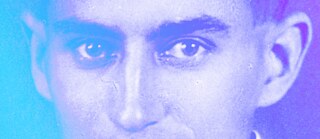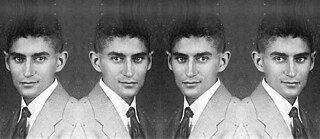Ironclad Logic The wings of a dove

“A novel is the wings of a dove that allow us to escape the logic of our own destiny. The whole trick is to strike upon the right solution not at the moment of our death, but much, much earlier.” Those are the words of Polish author and philosopher Grzegorz Jankowicz, written in reference to the works of Franz Kafka. Kafka’s protagonists find themselves in complicated life situations, trapped by the desire to live life in a correct manner. Sounds familiar? And what does that have to do with dove wings? Grzegorz Jankowicz investigates.
Just after the funeral of Franz Kafka, which was held on June 11, 1924 at the New Jewish Cemetery in Prague, his parents invited one of his friends, Max Brod, over to the house to see if there were not any valuable manuscripts or literary documents in his room. The idea must have come from Brod himself, but without the official invitation, the home archive would have remained off limits for some time at least.Among the numerous scraps of paper and the vast collection of manuscripts, Max found two undated requests made out to him. The first, written in pen, urged him to burn all of Kafka’s writings. The other, in pencil, had a short list of works that were worth salvaging: The Judgment, The Stoker, Metamorphosis, In the Penal Colony, The Country Doctor, and The Hunger Artist.
This story is well known, but perhaps you have failed to notice that three of these texts were written between late September and early December 1912. Less than three months. That must have been a remarkable time for Kafka, given (he believed) half of his worthwhile work was written then.
A moment of freedom
Kafka was like the proverbial centipede who had to check every one of his legs before beginning to dance. He was chiefly made up of doubts, which were time-consuming and almost always ended with mental or physical fatigue. There were few times in his life when he felt entirely free, when he was convinced what he was doing (and how) was correct.In the night of September 22 and 23, 1912 he managed to enter a state of creative ferment, and in a few hours he had written a short story, The Judgment. Soon he noted in his journal that this was the only real way to work. What did he mean? Above all, the free flow of his imagination, which made concepts grow out of one another. The text simply blossomed in him and unfolded according to its own logic. It seemed it was not Kafka writing the story, it was leading itself in the right direction. Corrections were superfluous, as every sentence appeared at once fully formed; he only had to release them from the chambers of his consciousness.
Everything that usually made Kafka irate, that distracted him and sapped his strength could not touch him now. The world sent impulses, of course (especially at night, when every rustle sounded like a missile blast in the writer’s ear), but they all bounced off the surface of an invisible curtain wrapped around the focused writer. Franz had had equally (or even more) intense creative periods, but when, in the last days of his life, he looked back, he was struck by the conviction that only then – between September and December of 1912 – did he manage to achieve what he had always dreamed of as a writer and what he needed most as a sensate creature.
The works Kafka named in the unsent letter to Brod are small masterpieces, yet he left behind many better works. Why were they omitted? I suspect that in the choice of these six works it was not literary quality that came first, but an essentially undefinable impression tied to the creative process itself. These stories were to be preserved because they came out of an alchemical process in which the substance of the imagination spilled over into the consciousness and was shaped into sentences that were perfect in every respect. At least to the author’s mind.
The conflict between the internal and external clock
The experience of time was also important. Kafka felt he always had to fight for a moment to write. He scrupulously planned his day to wrest free that moment, to keep it from the temptations of everyday life. Work, the home, the family, a multitude of chance events that wracked his nerves—how to craft sentences under all this pressure? How could they develop some kind of rhythm if he always had to be checking his watch? Time was always too quick or too slow. It usually ended with a sense of guilt at a wasted day, killing his last bit of vital energy.But that night (and a few other times in the weeks and months that followed) time “ran” differently. His picture of its chronological structure gave way to a sense that everything was moving a bit slower, allowing him to settle into the world. He did not have to rush for anyone or anything. A decade later, on January 16, 1922, Kafka wrote in one of his notebooks that he could not bear a life where the internal and external clocks disagreed. The internal clock hurtled forward wildly, releasing inhuman, even demonic forces. The external clock went its own normal pace.
The two worlds split apart, condemning the writer to a terrible fate; a horrifying scuffle went on inside of him. The hands of the internal clock sped up with intensive self-observation, which so stoked his mind that he could find respite. Every new thought about himself was another burden. Life turned into a string of torments, whose main root was the stubborn conviction that to survive he had to respond to a call, he had to do something at once, clear up a burning issue, meet a challenge, withstand the pressure. Come back!
Kafka’s life did not undergo a terrible transformation in January 1922. It had always been that way. With the exception of those nearly three months when he wrote The Judgment, The Stoker and Metamorphosis. Then the clocks were moving in synch.
The conflict between the internal and external clock seals the fate of many of Kafka’s protagonists. It is an experience undoubtedly shared by the protagonists in his three novels. Karl Rossmann, Joseph K., and K. cope with the consequences of how they react to this pressure. Kafka gives each of them at least one chance to alter their existential predicament. An opportunity comes from out of nowhere which—if only they could see it and make the right move—would free them from their impasse. Here is one example of such an opportunity—it is only one, though it is from a work that Kafka deemed worth saving.
The Stoker
The Stoker is the first chapter of a novel called The Man Who Disappeared (published by Brod as America). Kafka began writing it literally a few days after finishing The Judgment. Approximately six months later, in the night of March 9 through 10, 1913, he wrote a letter to Felice Bauer, stating that only this part of the novel had any value, as it was born of “internal truth.”We need to reconstruct the context of this statement. Kafka begins by confessing that he was leading an irrational and sluggish life. Time was trickling through his fingers and, though at first glance, the fabric of his existence did not seem frayed, he could constantly feel a fist pressing on the back of his neck. The night before he had made a discovery of sorts, which, strangely, had brought him relief.
For two months he had had no contact with his notebooks in which, from late September 1912 to January 1913, he had written the various parts of The Man Who Disappeared. Suddenly those notebooks “towered before him” (whatever this means) and he began paging through them. He concluded that of 550 large notebook pages, only fifty-six were any good. The rest were a memory of a “great feeling” he no longer had, which is why they had to be discarded.
The main protagonist of The Stoker (and the whole novel), the teenage Karl Rossmann, is on board a transatlantic ship to the port of New York. We learn at once that he was expelled from home by his parents, having had a fling with a servant girl, with whom he had a child. To avoid paying alimony and a scandal, he was sent across the ocean.
Sentenced to the fate of a migrant, full of energy and enthusiasm, yet naive and gullible, Karl is approaching the border of an unfamiliar world. He has had just a short stint in Europe, a time which could hardly fill a novel, a homeland abandoned at his parents’ bidding (the emotional aspect of this experience seems wholly beyond our protagonist). Before him is the future, of which, understandably, he is slightly anxious, especially as the Statue of Liberty, which appears in the work’s opening paragraph, is holding not a torch, a symbol of light dispersing the darkness of the world, but a menacing sword.
The narrator makes us understand that Karl is not thinking of disembarking (hard to say if this is fear, or if he is simply in no hurry). He is only prompted to move when a passenger he briefly met nudges him on. This person asks if he intends to get off with the rest, Karl responds in the affirmative, though at just that moment he remembers he’s lost his umbrella below deck.
He decides to duck downstairs to find it, having left a stranger to mind his trunk. This is odd behavior. Entrust a random individual with your possessions just to get an umbrella? Kafka is evidently sending us a signal that this brolly is of special value. He holds it like a torch or a sword. It provides shelter, obviously, but stretched out in front of us, it looks like a shield.
Perhaps this whole fragment ought to be interpreted symbolically. Karl is acting under anxiety. He runs below deck to find his apotropaic artifact, which makes him feel a bit better in a strange land. And then comes a sequence of events, of which one is a portal to another reality.
Where am I likely to find a better friend?
Of his protagonist, Kafka writes: “In his bewilderment, meeting no one and hearing nothing but the ceaseless shuffling of thousand of feet above him, and in the distance, like faint breathing, the last throbbings of the engines, which had already been shut off, he began unthinkingly to hammer on a little door by which he had chanced to stop in his wanderings” (trans. Willa and Edwin Muir).
This is, perhaps, one of the most iconic scenes in the whole Kafka universe: a man standing at the gates of a building and trying to get in, although, for various reasons, this remains impossible. Here things are different. A voice from the cabin says it’s open, so there’s no sense in pounding. The ship’s stoker lives inside. He warmly invites Karl in, though the cabin is tiny. When the young man hesitates, as usual, the stoker pulls him in and points to a place on his bunk.
They begin talking, and the conversation recalls both a polite exchange and a philosophical dispute, whose stakes are a key existential decision, though perhaps neither of them realizes it. What is going on? The stoker shows Karl concern, which inspires the latter to think: “Perhaps I should join up with this man (…) where am I likely to find a better friend?”
Just as a moment before an impulse prompted him to trust a stranger and leave all his possessions under his care, now he swiftly concludes things that seem absurd under the circumstances. But this is how Kafka assembled his plots: he gave the reader abrupt and surprising twists that seemed to cancel out everything his protagonists had been through, and did not promise a logical continuation.
The speed with which Karl draws his conclusions might be put down to his youth, emotional immaturity, or awful naivete, but if we know the rules of Kafka’s world, we avoid making such judgments. Perhaps the stoker—whose life on the ship is hard, for, being a German, he was constantly badgered by a Czech machinist named Schubal—really could give Karl the support he needs, with his presence alone perhaps he could put the young man’s life on the right track.
Crossing into the stoker’s tiny cabin seems a gesture logically following Karl’s subconscious plan: he was seeking an umbrella, that is, a shield, that is, security, which is why he ended up where a man was offering to help. The protagonist sees this possibility, but to bring it to fruition he must remain in the orbit of its effect. This is the hardest trick of all. The stoker occupies the lowest rung of the ship’s hierarchy, though his work is of fundamental significance for the other crew members and travelers. He is forever facing discrimination owing to his ethnicity and profession (people look down on him for doing the lowest kind of work). The rules of the social system that bind the stoker are slightly bent, yet everything still operates mercilessly.
Karl wants to help his new acquaintance, so he decides to accompany him on a visit to the captain, to support his request for just compensation for the harm he has suffered. As soon as they go upstairs, the system swiftly catches them both in its claws. Karl gets lost confronting members of the hierarchy of the ship’s officers. Furthermore, as often happens in Kafka, his uncle appears “out of nowhere,” having been informed of the young man’s arrival in America by a letter from the aforementioned servant.
The thought of staying with the stoker, remaining in this peculiar space the ship holds, being rooted in a spot where he cannot really belong, yet which nonetheless holds some existential allure, begins to quickly fade in Karl, or is pushed aside by another thought, another observation, a new desire. The inner watch begins to gallop, and demonic forces hurl our protagonist into the future’s embrace.
In the end, it’s all about letting go.
At the end of The Trial we read: “Die Logik ist zwar unerschütterlich, aber einem Menschen, der leben will, widersteht sie nicht.” Mike Mitchell translates this as follows: “Logic may be unshakeable, but it cannot hold out against a human being who wants to live.” This is the last scene of the novel. A quarry outside of town is plunged in the darkness of the night. Joseph K. half-reclines on a rock. Over him stand two “officers,” passing each other the knife with which they mean to kill him. The protagonist sees a figure in the window of a faraway building and wonders if there is still some way, some strategy, to escape his terrible fate.
And then Kafka offers the above statement. It sounds thoroughly ironic. We are forever pushing ourselves forward in the name of life—a better life. Remember that? To rescue it we must respond to a call, we must do something, resolve a burning question for someone, explain ourselves in front of someone, meet a challenge, endure pressure. Yet it is precisely then, at the point when we think we are reacting to our most vital inner impulses, that we fall into the trap of perdition.
The more we want to live, the quicker we succumb to the pressure of the symbolic order, which turns us into officers of the department of ambition. It always seems we must do more to deserve recognition, to justify our existence. The more we assimilate this logic, the greater the scale of destruction in and around us. I wrote that Kafka’s phrase is ironic, because we do everything out of a will to live, while the idea is to let it go.
Reiner Stach has left us a marvelous commentary to this phrase from The Trial: to his mind, the drama of Kafka’s protagonists is in the fact that they are always one novel behind. If Karl Rossmann, Joseph K., and K. could read the novels in which they are protagonists beforehand, perhaps they would succeed in making a radical step: they could enter the wings of reality, where the clocks work differently. A bit like in Psalm 55, where a trembling heart and terror prompt a desire to flee: “And I said, Oh that I had wings like a dove! For then would I fly away, and be at rest.” This is the fragment to which the title of Henry James’s work alludes.
A novel is the wings of a dove that allow us to escape the logic of our own destiny. The whole trick is to strike upon the right solution not at the moment of our death, but much, much earlier.


